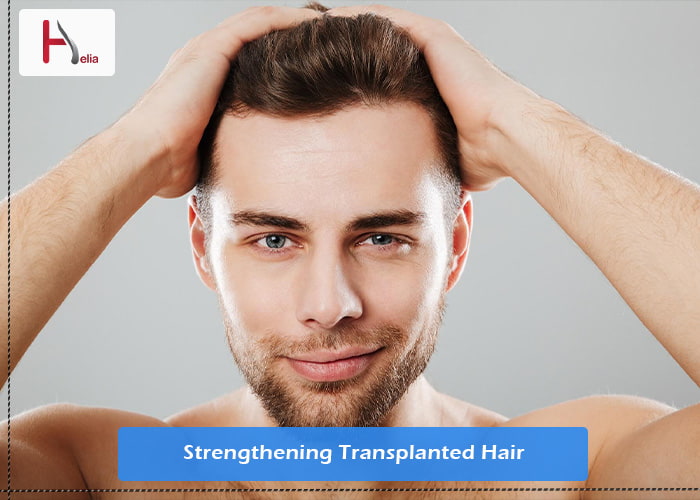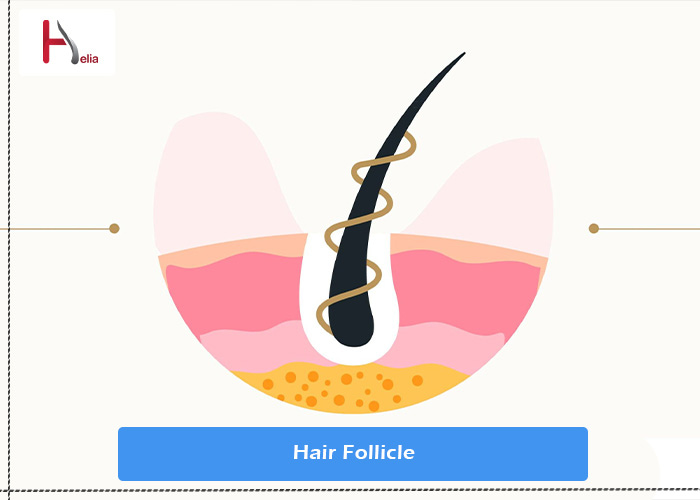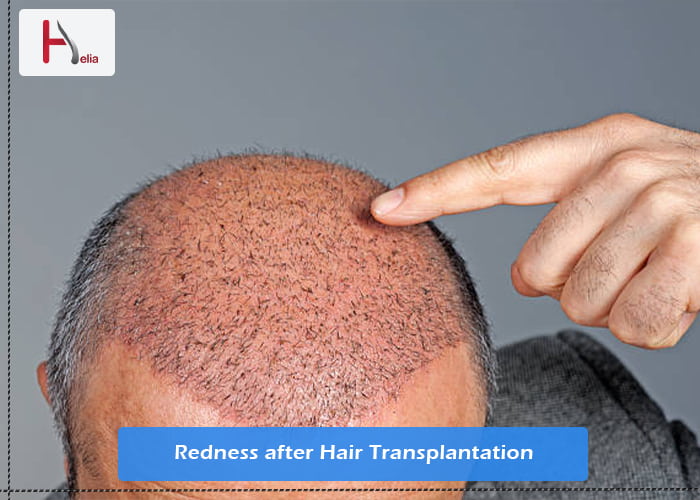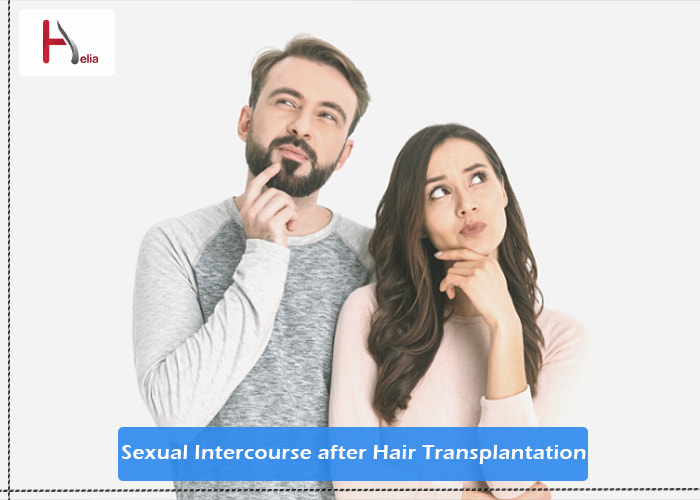You must know that one of the best measures to get the desired result from hair transplants is to take care of them properly to not damage the newly planted grafts. There are things that you can do to strengthen your transplanted hair so that new hair grows with strength, thickness, and excellent texture. So, the question must have arisen for someone who has done a hair transplant in recent days or who is planning to do this, is what measures or what medicines or food should be taken to strengthen their transplanted hair and enjoy their healthy and plump hair?
In this article, we are going to discuss the issue of improving the condition and strengthening of your transplanted hair, so we recommend that you follow our article until the end.
What Is the Purpose of Strengthening Hair After Hair Transplantation?
It is better to have a brief definition of the hair transplant process and then we will discuss the care points for strengthening the transplanted hair. During the hair transplant process, small groups of healthy hair follicles – called grafts – are extracted from an area of the scalp known as the “donor area” and transplanted to the thinning or balding area. Although these transplanted hairs will fall out within a few weeks after surgery, remember that the hair itself is dead, but the transplanted follicles are “alive” and healthy, and new hair growth will soon begin in that area.
If you have had a hair transplant or other hair restoration surgery, taking care of your hair as well as strengthening your transplanted hair is now more important than ever. While thinning hair, hair loss, and baldness are heavily influenced by genetics, there are some things you can do to help take care of what you have. Although the implanted hairs are removed and implanted from areas resistant to hair loss and are more resistant to hair loss than the natural hair of the individual, hair loss due to aging is inevitable. But rest assured! Because after the hair implant, you will suffer from hair loss but you will not go bald.
So, in general, it can be said that the purpose of strengthening transplanted hair is to prevent the loss of newly transplanted hair and also to prevent excessive loss of a patient’s natural hair, and this is done by taking care of your hair to prevent fat accumulation, breakage, and splitting ends (hair leprosy), all of which can weaken the hair. It’s also important to note that the ideal hair care routine is different for everyone, but some basic principles can help keep your hair healthy.
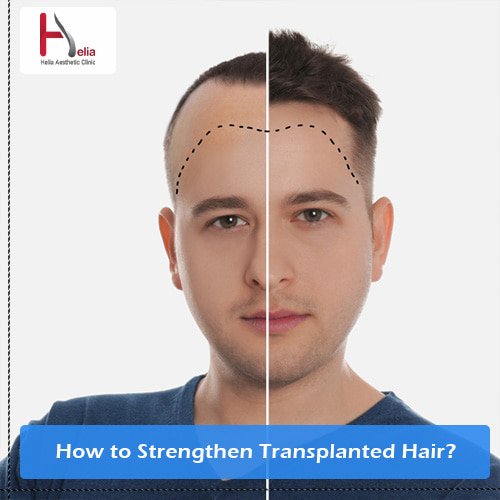
How to Strengthen Transplanted Hair?
There are different ways to strengthen your transplanted hair, and as mentioned before, one of them is proper care of newly transplanted hair. Among these care principles, one of the most common ones is to use shampoo for daily hair washing. Try to avoid using shampoos that contain chemicals or too much perfume. Look for products without sulfates, parabens, dyes, GMOs, and mineral oils, which can dry out your hair.
Be delicate with your hair when it is wet because it is much more fragile than dry hair. Instead of using a coarse cotton towel to dry your hair, choose a soft towel or tissue. Avoid using heat tools to dry or style your hair as they may weaken or make your hair brittle.
A healthy diet can help keep your hair healthy after a hair transplant. Among the healthy diet, we can mention the inclusion of various vitamins, proteins, and minerals in the diet, which can strengthen your transplanted hair. For example, citrus fruits, strawberries, and red peppers are all rich in vitamin C, which boosts collagen production and has a positive effect on your skin and hair.
You must keep your body hydrated by consuming plenty of fluids, otherwise, your hair will be brittle and dry, which is more vulnerable than when there is enough water in your body. One of the most important steps you can take to strengthen your transplanted hair and overall health is to get enough sleep and reduce your stress levels. In addition to the mentioned cases, which are generally related to changing the lifestyle in a positive direction to maintain the health of the body and strengthen the transplanted hair, there are other methods that we will discuss in the following.
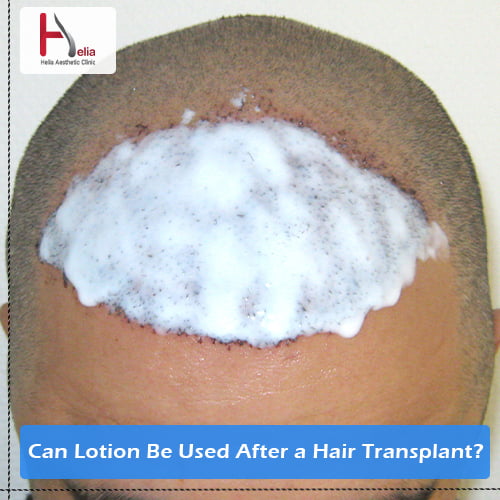
Can Lotion Be Used After a Hair Transplant?
Different lotions contain different ingredients to strengthen the transplanted hair, which you can use depending on the recommendation of your doctor. It is better to cover the grafted area with lotion, oil or any other suitable moisturizer and let it stay on your head for 15-30 minutes in the days after the implantation if your expert surgeon decides. This causes a softening effect on the scabs around the transplanted grafts and the donor area. This stage of softening the scalp also helps to remove traces of dried blood and faster healing of the place of implantation and hair extraction.
But after hair transplantation, you can use anti-shedding lotions that contain quinine, saw palmetto, and vitamin B5. Each of these substances is a real source of energy for hair, which restores strength and life to weak hair. This lotion improves the scalp after the hair implant and stimulates the hair follicles for healthy and strong hair growth.
Medicines to Strengthen Hair After Implantation and Their Effect on Strengthening Implanted Hair
The most important points that you should pay attention to for a successful hair transplant are the post-operative hair transplant instructions and the use of post-transplant care medications. Some medications should be used to prevent possible hair loss or strengthen the transplanted hair and minimize complications after hair transplantation. A successful result is inevitable when the hair transplant technique is combined with the appropriate post-operative hair growth medications. In this part of the article, we will talk about the best hair loss treatment to shorten the recovery time after a hair transplant.
The most important thing to consider after hair transplantation is probably the use of appropriate medications recommended by the doctor to strengthen the transplanted hair and make it resistant to hair loss. Once approved by a dermatologist, there are medications and shampoos that you can use based on your preferences and health and hair condition. Considering the sensitivity of the operation area and possible wounds in the donor area and the recipient area, choosing the right drugs and hair care products has a significant impact on faster recovery after hair transplantation. Medicines that are used after hair transplantation should have healing effects and stimulate hair growth. Types of drugs include:
Minoxidil, also known as Rogaine, is a topical medication used to stimulate new hair growth for men and women with scalp hair loss. Minoxidil is the first drug approved by the FDA as a hair loss treatment.
Finasteride, also known as Propecia, is a prescription drug used for androgenetic alopecia (male pattern baldness). It reverses DHT-induced hair follicle shrinkage and reduces DHT levels in the scalp to promote growth and stimulate new hair. Although finasteride results may vary from person to person, finasteride is believed to reduce DHT levels by 70% and increase testosterone levels by 9%. The consumption of Finasteride (Propecia) for one year is recommended to protect and strengthen the transplanted hair.
Biotin for hair is often recommended as a supplement to strengthen hair and nails. Doctors recommend using biotin for at least 6 months after a hair transplant. Taking biotin after a hair transplant, also known as vitamin B7, ensures that new hair grows much faster and enhances the quality of existing hair.
Thanks to its beneficial effects on cell growth, stronger hair will grow and hair loss can be controlled. Biotin is known as the “beauty vitamin” due to its positive effects on hair and skin. In case of biotin deficiency, hair loss, graying of hair, or graying of hair may occur.
Doctors recommend taking antibiotics after a hair transplant to prevent possible infection. Because there is always a risk of infection both in the head and in the donor area after the operation.
Taking hair growth supplements after hair transplantation can increase the quality of transplanted hair and reduce hair loss. There are certain medications and aftercare treatments that must be followed to obtain a satisfactory result from hair transplantation. This is why it is so important to use these hair loss medications after hair transplant to strengthen the transplanted hair as well as the existing hair in the long term.
What Is the Solution Used After Hair Transplantation?
Among the solutions used after hair transplantation is minoxidil, which is available topically in a 2 or 5 percent solution or in the form of a 5% foam. Minoxidil prolongs the hair growth cycle and delays the hair loss cycle. Regular use is recommended by experts for up to one year after hair transplantation. Both minoxidil for strengthening implanted hair and minoxidil for beard, increase hair thickness and density. In about 60 to 70 percent of candidates, hair density usually begins to increase within 2 to 3 months. In addition to stimulating hair growth and suppressing receding hairline, minoxidil increases the density and thickness of hair, and strands become thicker and stronger.
How to Use Olive Oil After Hair Transplantation?
After a certain period and with the permission of your doctor, you can use a variety of vegetable oils that supply the nutrients needed by hair and strengthen hair growth, because massaging the scalp after hair transplantation with different oils can prevent damage to newly transplanted follicles. Usually, ten days after hair transplantation, doctors recommend using olive oil.
How to use this product is that you pour some olive oil on your palm and gently rub it on your scalp with your fingers. After half an hour, go to the bathroom and gently rub your hair with baby shampoo a few times and try to massage the transplanted hair and scabs several times with baby shampoo. Don’t worry if you get scabs because it’s a normal thing.
Using Woad After Hair Transplant
Woad is one of the types of medicinal plants that, like henna, has therapeutic properties for strengthening and growing hair and eyebrows, and also has cosmetic and hair coloring properties. Using this combination to strengthen transplanted hair is better done under the supervision of your doctor, and the exact time of using this herbal substance will depend on your doctor’s discretion, but in general, it has many healing and strengthening properties after hair transplantation and it improves the growth of newly transplanted hair.
Restorative Cream After Hair Transplantation
Many people complain about the wounds caused by the extraction and implantation of hair in their heads and are looking for ways that can be effective in repairing these wounds and preventing scars as much as possible. One of these ways is using restorative cream after hair transplantation, but make sure that you use these types of products only with the prescription of your doctor so that you do not suffer from the side effects of using them.
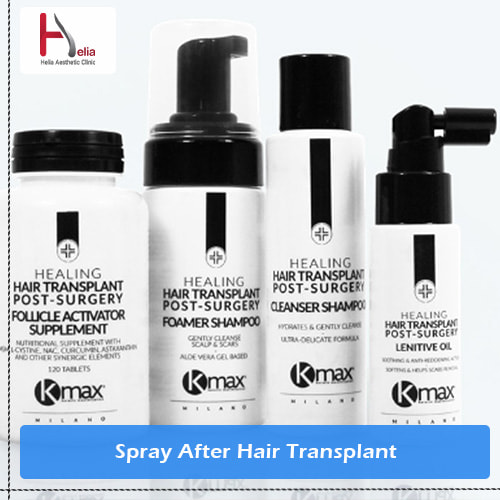
Spray After Hair Transplant
Concerning suitable sprays to strengthen transplanted hair, it is said that you should use moisturizing sprays prescribed by the doctor in the first and crucial days after hair transplantation to keep the wound areas moist due to hair removal and transplantation. After 3 days or even more, you will no longer need to use special sprays unless your doctor recommends a special product for you.
But when a certain period has passed and the implanted grafts and follicles have stabilized in their place, you can use hair strengthening and growth-enhancing sprays to provide all kinds of vitamins and nutrients needed by the hair to strengthen the implanted hair.
Be careful that all the mentioned items are medicinal and therapeutic and all should be used under the supervision of your doctor. After that, avoid using all the mentioned items arbitrarily and use them only if your doctor prescribes them.
Of course, apart from the mentioned cases, there are other methods to strengthen the transplanted hair, which you can do after a certain time and after the recovery period and according to your doctor’s order. Among these methods can be mentioned hair mesotherapy, PRP and carboxytherapy.
Helia Specialized Beauty Center is one of the best hair transplant and restoration centers that has advanced equipment and methods and operates in Tehran. If you have any kind of hair loss problem or need to transplant hair with methods such as micrograft, SUT, combined, etc…, you can contact this clinic and get a free consultation from this center about the available methods and information about the price.

